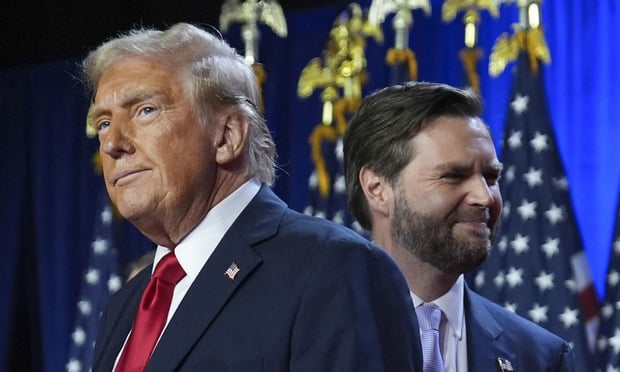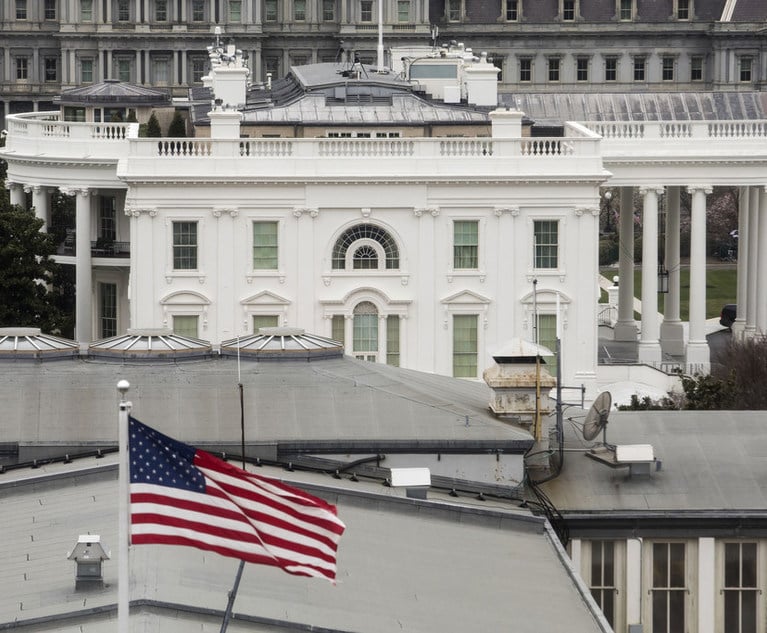 Alan Morrison, Lerner Family Associate Dean for Public Interest and Public Service Law at George Washington University Law School, left, and U.S. Solicitor General Noel Francisco, right. Photos: Diego M. Radzinschi/ALM
Alan Morrison, Lerner Family Associate Dean for Public Interest and Public Service Law at George Washington University Law School, left, and U.S. Solicitor General Noel Francisco, right. Photos: Diego M. Radzinschi/ALM Fight Over Trump's Trade Tariffs Lands at the U.S. Supreme Court
The petition claims a provision that allows a president to impose "national security” steel and aluminum tariffs is an unconstitutional delegation of Congress' powers.
June 04, 2019 at 04:01 PM
5 minute read
As Mexico races to avoid punishing tariffs proposed by the Trump Administration, a quiet fight over the constitutionality of the president's power to impose certain trade tariffs is underway in the U.S. Supreme Court.
Later this month, the justices will take their first look at a petition in which the American Institute for International Steel and others contend that a provision in the Trade Expansion Act of 1962, used last year by President Donald Trump to impose “national security” steel and aluminum tariffs, is an unconstitutional delegation of Congress' power to the president that violates the Constitution's separation of powers.
The challenged provision—Section 232—”essentially turns over to the President the entirety of Congress's constitutional power to impose tariffs and other restrictions on imports,” wrote the institute's counsel, Alan Morrison of the George Washington University Law School, in American Institute for International Steel v. United States.
Trump's action was the first time in nearly 40 years that a president exercised authority under Section 232, and it was the first time ever that a president used the section to restrict trade in goods other than petroleum in the '70s, according to trade law experts.
This case, said Morrison in an interview, is not about Trump, “except he and his lawyers saw this opening and took advantage of it. It's about Congress. Trump presses all the boundaries and this was one nobody wanted to press. But the flaw [in the law] has been there since the law was enacted.”
If the delegation of power in Section 232 is upheld, Morrison's petition states, “Congress will be permitted to assign the President the unchecked power to make any laws regarding taxation and regulation of foreign commerce, as he sees fit, in violation of the fundamental principle of separation of powers.”
But U.S. Solicitor General Noel Francisco, in his brief in opposition to high court review, countered: “Far from subverting the fundamental principle of separation of powers, Section 232 is consistent with more than a century of this Court's precedents and more than two centuries of congressional practice.”
In March, the institute lost its challenge to Section 232 before a three-judge panel of the U.S. Court of International Trade. One of the panel judges did express concerns about the breadth of the delegation in section 232, writing, “if the delegation permitted by section 232, as now revealed, does not constitute excessive delegation in violation of the Constitution, what would?”
But the panel held that it was bound by the Supreme Court's 1976 decision in Federal Energy Administration v. Algonquin SNG. In that case, involving tariffs on petroleum, the justices ruled that Section 232 contains an “intelligible principle” for the delegation of congressional trade powers to the executive, and therefore did not violate the constitutional separation of powers.
Morrison is asking the high court to hear the tariff challenge before the usual appeal to the U.S. Court of Appeals for the Federal Circuit. He argues that only the Supreme Court can decide whether the 1976 Algonquin decision applied. And, he adds, going through the Federal Circuit would allow the tariffs to continue to cause billions of dollars of harm—nearly $5 billion by some estimates. That harm, he wrote in his petition, does not include massive injuries to agriculture and other industries from retaliation by other countries against U.S. exports because of the steel and aluminum tariffs.
The unconstitutionality of Section 232, according to the challenge, follows from the lack of an “intelligible principle” that guides or constrains the president's discretion. The petition contends Section 232:
- lacks procedural protections that might limit presidential discretion.
- has no requirement that a president must or must not consider adverse consequences on downstream industries or U.S. consumers.
- provides no guidance on whether or when a president should treat imports from various countries on a nondiscriminatory basis, or exempt segments of industries.
- and includes “an essentially unlimited definition of national security.”
The Justice Department's Francisco counters that the petition is premature and the justices should await an appeal to the Federal Circuit. He also suggested a high court case awaiting decision since October—Gundy v. United States, a nondelegation challenge to the Sex Offender Registration and Notification Act—could shed light on the analysis in the tariff case.
Francisco argues that the president's discretion is constrained more under Section 232 than in other “purely domestic” cases in which the justices rejected non-delegation challenges.
“Here, in contrast, the statute empowers the President to act only upon a finding that the imports of an article 'threaten to impair the national security,'” he wrote in his brief. “If there is any area in which common sense and the inherent necessities of governmental coordination support a grant of discretion to the President, it is the area in which Section 232 operates: 'national security.'”
The institute's petition has drawn amicus support from the National Foreign Trade Council, which includes more than 100 companies across most major sectors of the U.S. economy. Its counsel is Keith Bradley, partner in Squire Patton Boggs in Denver; the Cato Institute, represented by Cato's Ilya Shapiro, and Basrai Farms, with counsel Jeffrey Grimson of Washington, D.C.'s Mowry & Grimson.
This content has been archived. It is available through our partners, LexisNexis® and Bloomberg Law.
To view this content, please continue to their sites.
Not a Lexis Subscriber?
Subscribe Now
Not a Bloomberg Law Subscriber?
Subscribe Now
NOT FOR REPRINT
© 2024 ALM Global, LLC, All Rights Reserved. Request academic re-use from www.copyright.com. All other uses, submit a request to [email protected]. For more information visit Asset & Logo Licensing.
You Might Like
View All

DC Judge, Applying 'Loper Bright,' Dismisses Complaint in Medicare Drug-Classification Dispute
4 minute readTrending Stories
- 1Judicial Ethics Opinion 24-60
- 2California Implements New Law Banning Medical Debt From Credit Reports
- 3Trump Picks Personal Criminal Defense Lawyers For Solicitor General, Deputy Attorney General
- 4Climate Groups Demonstrate Outside A&O Shearman and Akin Offices
- 5Republican Who Might Become FTC's Next Chair Blasts Democratic Commissioners' 'All Mergers Are Bad' Mindset
Featured Firms
Law Offices of Gary Martin Hays & Associates, P.C.
(470) 294-1674
Law Offices of Mark E. Salomone
(857) 444-6468
Smith & Hassler
(713) 739-1250









